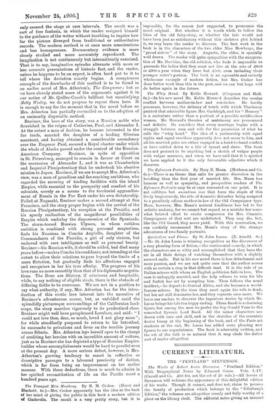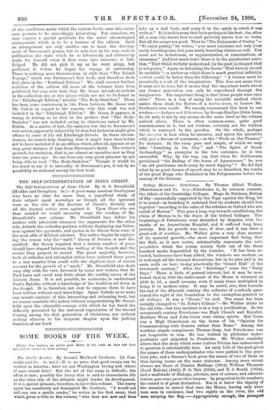C URRENT LITE RAT U RE.
THE " PENTLAND" STEVENSON.
The Works of Robert Louis Stevenson. "Pentland Edition." With Biographical Notes by Edmund Gosse. Vols. I.-IV. (Cassell and Co. £10 10s. net the set of 20 vols.)—All lovers of Stevenson will welcome the appearance of this delightful edition of his works. Though it cannot, and does not, claim to possess the beauty of production which belongs to the "Edinburgh Edition," the volumes are altogether seemly and fully worthy of a place on the library shelf. The editorial notes giving an account
of the conditions under which the various books came into exist- ence promise to be exceedingly interesting. For ourselves, we may express a special gratitude for the strict chronological arrangement which is to be a feature of the edition. Such an arrangement not only enables one to trace the develop- ment of Stevenson's genius, but to note how in his very earliest publication the style which he so laboriously and elaborately made for himself when it does come into existence is full- fledged. He did not pick it up as he went along, but perfected it b3fore he began his voyage of authorship. There is nothing more Stevensonian in style than "The Inland Voyage," which was Stevenson's first book, and therefore finds first place in the "Pentland Edition." We shall reserve further criticism of the edition till more of the volumes have been published, but may note here that Mr. Gosse intends to include in the collection one or two pieces which are not to be found in the "Edinburgh Edition," notably "The Body-Snatcher." There has been some controversy in the Press between Mr. Gosse and Mr. Colvin in regard to the reasons why this work was not included in the "Edinburgh Edition." Mr. Gosse, it appears, is wrong in stating as he does in his preface that "The Body- Snatcher" was not included owing to objections raised by Mr. Colvin. As a matter of fact, the omission was due to Stevenson's own action, apparently induced by his fear lest inclusion might give offence to some of his old Edinburgh friends. In these circum- stances, we cannot help thinking that it might have been better not to have included it in an edition which, after all, appears at no very great distance of time from Stevenson's death. The writer's grounds for exclusion, that is, are almost as operative now as they were ten years ago. No one loses any very great pleasure by not being able to read "The Body-Snatcher." Though it would be too much to say it is unworthy of Stevenson's pen, it can by no possibility be reckoned among his best work.















































 Previous page
Previous page